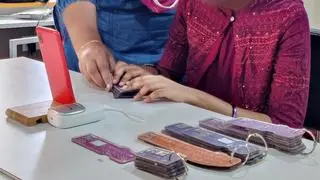Given his experience in dealing with farmers and his background in organising supply chains for large retail chains, Lakshmipriyan VG decided to stick to this line when he turned entrepreneur. His last job was head of buying and merchandising for Bharti Walmart in the southern, western and central regions, which involved working with banana farmers in Mysuru region.
“As an initiative, we had taken some farmers from Mysuru region, built a model saying this is direct from the farm,” says Lakshmipriyan. When he quit the joint venture, there was no one to take that initiative forward, which is what he decided he would do on his own.
Thus was born FarmFolks Agro Pvt Ltd in September 2015. It was just a question of reviving his relationship with the farmers. The aim was to come up with a model where all the players in the value chain benefit – farmers, retailers and customers. Lakshmipriyan started off working with banana growers in Mysuru region. “We thought just by sourcing from the farmer and giving it to the customer it is not going to meet the entire expectations of both the stakeholders – the farmers on one side and the retailers on the other,” he says.
FarmFolks Agro, thus, decided to deepen its relationship with the farmers, providing them with quality inputs at cheaper rates than what they were used to paying, identifying the right input, sending people over to harvest the fruits when they were ready to be plucked, transporting them to the ripening centre in Bengaluru, and then selling them to retailers after completing cleaning, grading, sorting and branding. “We give them tissue culture plants. We give them inputs for the entire crop cycle. At the end of it, when it is ready for harvest, we send our in-house team to harvest the produce. There onwards, it is our product,” adds Lakshmipriyan.

FarmFolks, according to him, has come out with a package of practices for the banana crop that it shares with the farmers. This package tells the farmers on what they should do right from preparing the soil till the crop is ready for harvest. The package has been designed in consultation with professors from horticulture university, experts from the horticulture department and the company’s own team. FarmFolks has outsourced a software application from a Bengaluru-based agriculture technology start-up CropIn Technologies and farmers it deals with get alerts on what needs to be done at what time.
Avoid middlemen
According to Lakshmipriyan, FarmFolks’ intervention helps the farmers in more ways than one. For instance, a small farmer who has about a tonne of bananas to sell, will find it difficult to get people to come and harvest the crop or transport it to the mandi. Thanks to FarmFolks, both the harvesting and the transportation are taken care of. Also, they no longer have to deal with middlemen who buy the produce from them and sell to the retailers at a higher price. FarmFolks pays the farmers the prevailing market price for the produce and also ensures that the payment is done immediately. Besides, thanks to improved inputs and better use of micro-nutrients, the output increases.
The company also helps farmers get Global GAP (Good Agricultural Practices) certification, which means the produce is safe to eat and that the residue levels are lower than the prescribed norms.
Pact with Karnataka Govt
He reckons that farmers will be able to save at least 15 per cent in the cost of cultivation, not to mention the savings in transportation costs and the benefits by doing away with intermediaries. FarmFolks has signed an agreement with the Karnataka government to bring more farmers on its platform. It has also tied up with pineapple growers in Kerala and for vegetables such as carrots, potatoes, broccoli and lettuce in the Nilgiris. It works with nearly 900 farmers and handles nearly 900 tonnes of produce, of which bananas account for 350 tonnes, pineapples 200 tonnes and vegetables in the Nilgiris 150 tonnes.
According to him, FarmFolks gets its income from the margin it makes when it sells to retailers. It plans to shortly launch GAP-certified bananas, which will command a premium from the retailers. He expects the company to break even in the first quarter of next year. It may look at a fresh fund raise after six months.








Comments
Comments have to be in English, and in full sentences. They cannot be abusive or personal. Please abide by our community guidelines for posting your comments.
We have migrated to a new commenting platform. If you are already a registered user of TheHindu Businessline and logged in, you may continue to engage with our articles. If you do not have an account please register and login to post comments. Users can access their older comments by logging into their accounts on Vuukle.